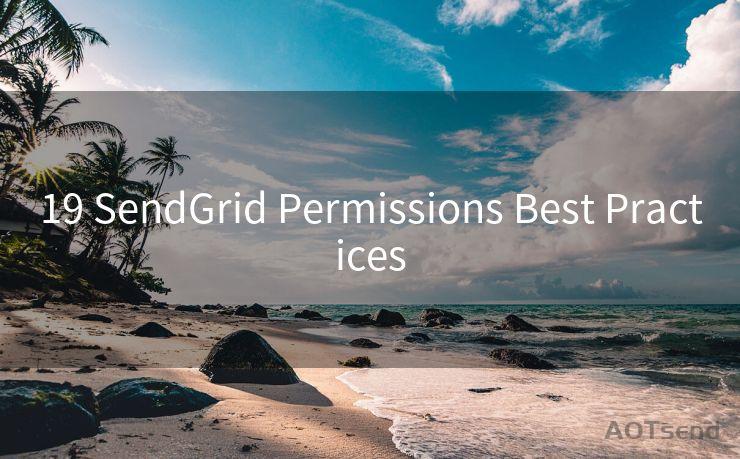19 SendGrid Permissions Best Practices




When it comes to email delivery, SendGrid stands as a popular choice for developers and marketers alike. However, with great power comes great responsibility, and managing permissions within SendGrid is crucial for maintaining the security and integrity of your email communications. Here are 19 best practices for managing SendGrid permissions to ensure secure email delivery.
1. Understand Permission Levels
Before granting permissions, it's essential to understand the different permission levels available in SendGrid. These levels determine what actions a user can perform within the platform. Familiarize yourself with these levels and assign them appropriately.
2. Principle of Least Privilege
Follow the principle of least privilege, which states that a user should only be given the minimum permissions necessary to perform their job. This minimizes the risk of accidental or malicious misuse of access.
3. Separate Administrative and Operational Roles
Distinguish between administrative and operational roles. Administrative roles should be limited to those who need to manage user accounts, settings, and permissions, while operational roles are for those sending emails or accessing reports.
4. Use Subusers for Delegation
Create subusers with restricted permissions for tasks like sending emails or managing specific campaigns. This delegation ensures that each team member only has access to what they need.
5. Two-Factor Authentication
Enable two-factor authentication for all accounts, especially those with administrative privileges. This adds an extra layer of security to prevent unauthorized access.
6. Regularly Review Permissions
Conduct periodic reviews of user permissions to ensure they are still appropriate and necessary. Remove or adjust permissions as roles and responsibilities change.
7. Monitor Suspicious Activity
Utilize SendGrid's activity logs to monitor for any suspicious or unauthorized activity. Promptly investigate and respond to any unusual patterns.
8. IP Access Management
Restrict account access to specific IP addresses if possible, reducing the risk of unauthorized access from unknown locations.
9. Secure API Keys
Protect your SendGrid API keys like you would any other sensitive credential. Rotate keys periodically and avoid storing them in insecure locations.
10. Avoid Sharing Credentials
Never share your SendGrid credentials with anyone, even within your team. Instead, create separate subuser accounts for each individual.
🔔🔔🔔
【AOTsend Email API】:AOTsend is a Managed Email Service for sending transactional emails. Support Email Types: reminders, authentication, confirmations, notifications, verification codes, invoices, password resets, account activations, billing statements, two-factor authentication (2FA), and one-time passwords (OTP) emails, etc. $0.28 per 1000 Emails. 99% Delivery, 98% Inbox Rate.
You might be interested in:
Why did we start the AOTsend project, Brand Story?
What is a Managed Email API, How it Works?
Best 25+ Email Marketing Platforms (Authority,Keywords&Traffic Comparison)
Best 24+ Email Marketing Service (Price, Pros&Cons Comparison)
Email APIs vs SMTP: How they Works, Any Difference?
11. Enforce Strong Passwords
Require strong, unique passwords for all SendGrid accounts. Consider using a password manager to generate and store these passwords securely.
12. Educate Your Team
Provide training and education to your team on SendGrid's best practices, including permission management and security protocols.
13. Limit Global Permissions
Avoid granting global permissions unless absolutely necessary. Fine-grained permissions allow for more precise control over access.
14. Audit Trail
Maintain an audit trail of permission changes, including who made the changes and when. This helps in troubleshooting and accountability.
15. Disable Unused Accounts
Disable or delete any unused SendGrid accounts to reduce the attack surface and potential security risks.
16. Multi-Factor Authentication for Sensitive Operations
Consider implementing multi-factor authentication for sensitive operations like changing account settings or sending high-volume campaigns.
17. Keep Software Up to Date
Regularly update SendGrid and any integrated systems to ensure you have the latest security patches and features.
18. Backup and Disaster Recovery Plan
Have a backup and disaster recovery plan in place that includes permissions and access controls. This ensures business continuity in case of an emergency.
19. Ongoing Security Assessments
Conduct ongoing security assessments to identify and mitigate any potential risks related to permissions and access controls.

By following these 19 best practices for SendGrid permissions, you can significantly enhance the security of your email delivery and protect your organization from potential threats. Remember, security is an ongoing process, and staying vigilant is key to maintaining a robust and secure email communication system.




Scan the QR code to access on your mobile device.
Copyright notice: This article is published by AotSend. Reproduction requires attribution.
Article Link:https://www.mailwot.com/p6586.html



